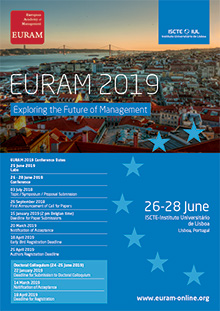SIG OFFICERS:
SIG board for 2019:
Martina Huemann, WU Vienna University of Economics and Business, Austria (Chair)
Alexander Kock, Technische Universität Darmstadt, Germany (Chair Elect and Communication Officer)
Monique Aubry, University of Quebec at Montreal, Canada (Programme Chair, Treasurer)
Toumas Ahola, Tampere University of Technology, Finland (General Track Chair, responsible for reviews)
Miia Martinsuo, Tampere University of Technology, Finland (Professional Development Support Officer)
Past Chairs, but still active:
Graham Winch, Manchester Business School, UK.
Miia Martinsuo, Tampere University of Technology, Finland
Hans Georg Gemünden, Berlin University of Technology, Germany
Rodney Turner, SKEMA Business School, France
Christophe Midler, École Polytechnique, France
Brian Hobbs, University of Quebec at Montreal, Canada
SIG contact 2019: Alexander Kock This email address is being protected from spambots. You need JavaScript enabled to view it.
GT10_00 Project Organising - SIG General Track
The Project Organising track provides an international platform to share and debate topical issues in the management of projects as temporary organisations and their context in organisations or inter-organisational networks. This includes the management of single projects, mega projects, programs, and project portfolios, as well as project-oriented organisations, which deliver projects to external or internal customers, and project networks or multi-enterprise meta-organisations created to deliver projects. We invite conceptual as well as empirical papers based on quantitative, qualitative or mixed methods. In our track, we run competitive sessions as well as development sessions, to help authors further develop their papers.
Tuomas Ahola , Tampere University of Technology, This email address is being protected from spambots. You need JavaScript enabled to view it.
PROJECT ORGANISING SIG TRACKS
T10_01 - Action research, collaborative research and participatory research - engaged scholarship in projects and innovations
Participatory and collaborative research approaches, such as action research, as a form of engaged scholarship, are effective in promoting interdisciplinary research to deliver social and technological innovation. They facilitate close cooperation between practitioners and researchers to link theory and practice. Participatory approaches have a broader perspective as a collaborative form of research to explore the future of management. They offer a grand opportunity to address key challenges in project and innovation management in a novel and constructive way. This track calls for papers that exemplify the use of collaborative and participatory approaches contributing to social and technological innovation by managing.
Per Svejvig , Aarhus University, This email address is being protected from spambots. You need JavaScript enabled to view it.
T10_02 - Human Resource Management on Projects and in Project Based Organisations
Project organizing is a core principle in many industries. Often conceptualized as temporary organizations (Burke and Morley, 2016), projects are established within and between organizational functions and span organizational boundaries, and populate networks. Projects are important sites of HRM activities (Keegan et al, 2017). We are interested in research that addresses questions such as: What issues arise for organizations in developing human and social capital on projects?; are HRM practitioners equipped to manage the HR aspects of project based organizing?; what kinds of careers do people have on projects?;how does project working impact on individuals well-being?
Anne Keegan , University College Dublin, This email address is being protected from spambots. You need JavaScript enabled to view it.
T10_03 - Projects & Society
Today, the impact of projects on economy and society is undeniable. Whether we look at the public or private sector (regardless of industry type), the relevance of projects on society is highlighted in academia and practice. This track seeks to advance the debate on the bidirectional relationship between projects and society: on the one hand (1) projects as a fundamental element to achieve societal objectives (e.g. energy reduction, sustainable development, social inclusion and SDGs) and on the other hand (2) institutional pressures that society exerts to shape projects in terms of success, expectations, value and benefits realisation.
Luca Sabini , Hertfordshire University, This email address is being protected from spambots. You need JavaScript enabled to view it.
T10_04 - The Bounded Manageability of Major Projects
Two words sum up the impact of major projects: "transformational" and "complex". Major projects could improve the quality of life of individuals, foster the growth of a national economy, develop entire cities to become more attractive place to live and visit. While the transformational impact and complexity of these projects can be recognized, few researchers have considered new eras to understand these issues and a small number of researchers have looked at more innovative approaches to improve the management and governance of these major projects. This topic proposal raises the importance to understand the Bounded Manageability of Major projects.
Nathalie Drouin , École des Sciences de la gestion, UQAM, This email address is being protected from spambots. You need JavaScript enabled to view it.







